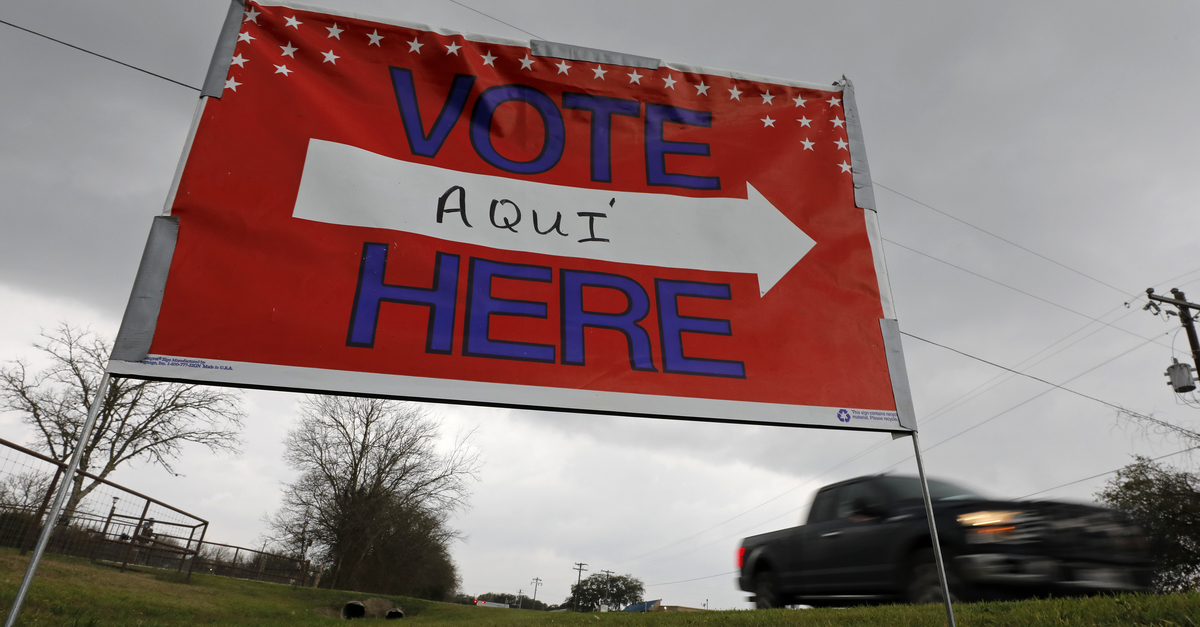
Election workers and voters in Texas will no longer be required to wear masks at polling locations, a federal appellate court ruled on Friday afternoon.
The eight-page order issued by the U.S. Court of Appeals for the Fifth Circuit overturns a previous order issued by a federal district court in the Lone Star State which found that a lack of a mask mandate at the polls discriminates against Black and Latino voters.
“We stay the district court’s preliminary injunction pending appeal,” the per curiam opinion notes.
Earlier this week, U.S. District Judge Jason Pulliam, an appointee of President Donald Trump, ruled in favor of civic participation advocacy group Mi Familia Vota Education Fund in an opinion hinged upon the Bill of Rights and landmark First Amendment jurisprudence.
Mi Familia Vota and other groups recently sued in federal court claiming that absent a mask mandate for polling locations, voters of color would be forced to choose between their health and their sacred right to the franchise.
“The very purpose of a Bill of Rights was to withdraw certain subjects from the vicissitudes of political controversy, to place them beyond the reach of majorities and officials and to establish them as legal principles to be applied by the courts,’” the judge wrote. “One’s fundamental rights is one such liberty intended to be undeniably sacred.”
A three-judge panel dismissed that finding, ruling in favor of Texas Governor Greg Abbott (R) and the other state defendants who aimed to continue exempting polling sites from Texas’s general mask mandate for indoor locations. This is referred to in one of Abbott’s executive orders related to facial coverings as “Exemption 8.”
Per the appellate court’s ruling:
The district court’s reasoning is flawed. The injunction was issued fourteen days after early voting began and one week before Election Day. Today, Friday, October 30, 2020, is the last day in Texas for early voting. General Election Day is four days away. A change in the election rules at this point alters the status quo established by GA-29 and Exemption 8 on July 2, 2020.
“We acknowledge that requiring voters to wear a mask in order to vote is not akin to the level of election disruption that would have resulted from other injunctions this court has stayed,” the opinion continues. “Nevertheless, the governor and sectary’s [sic] unrebutted evidence establishes that changing the election rules in the midst of voting would create disparate treatment of voters, and significant confusion and difficulty for voters and poll workers.”
According to Ronald Reagan-appointed Judge W. Eugene Davis and George W. Bush-appointed Judges Priscilla Owen and Leslie Southwick, Texas provided evidence “from five election officials who unanimously agreed that changing the election rules to require voters to wear masks this close to the election would be costly and cause voter confusion.”
The Elections Administrator for Moore County, which has a population of just over 20,000 people, averred that changing the election rules to accommodate a mask mandate late in the game would be a “shipwreck,” and that “such a change would cause voters to become angry and confused, and it would slow down our ability to run Moore County’s polling places.”
Oppositely, the district court previously found that from striking Exemption 8 would not be a “drastic change” and that any alleged harm would be “minimal and outweighed by the opportunity created for non-discriminatory access to the voting process.”
“Those citizens who arrive at a polling site while not wearing a facial mask will be easily recognized and options for compliance or redirection are not complicated or extensive,” Judge Pulliam determined. “[A]ny disruption is outweighed by the racially discriminatory deterrent effect on Black and Latino citizens’ fundamental right to vote.”
The GOP-appointed triumvirate took issue with that reasoning–arguing that counties with separate accommodations for voters without masks would become unlawful and unworkable if Exemption 8 was not allowed to stand.
The judges went on to say that they believed Abbott would likely win on their overarching legal theory that the district court “improperly altered election rules on the eve of the election.”
Invocations of that legal line of thought have been rampant in courtrooms and court orders the past few months.
As noted by the Friday appeals court opinion:
“The Supreme Court has ‘repeatedly emphasized that lower federal courts should ordinarily not alter the election rules on the eve of an election.’” “Time and time again over the past several years, the Supreme Court has stayed lower court orders that change election rules on the eve of an election.” “The principle from these cases is clear: court changes of election laws close in time to the election are strongly disfavored.”
Those lines are not all culled from the same U.S. Supreme Court cases but largely reflect the high court’s state of play related to what the Roberts Court currently perceives as election eve changes to voting rules.
Under the so-called Purcell principle, which stems from the case stylized as Purcell v. Gonzalez, federal courts should be loath to change election rules immediately prior to an election because such changes are likely to confuse and deter voters.
Texas has been early voting for over two weeks–in record numbers–though notably not so much in pandemic-plagued El Paso County.
The fact of massive voting and the change being made so late prompted the judges to find that the lower court “improperly altered election rules on the eve of the election.”
[image via Edward A. Ornelas/Getty Images]